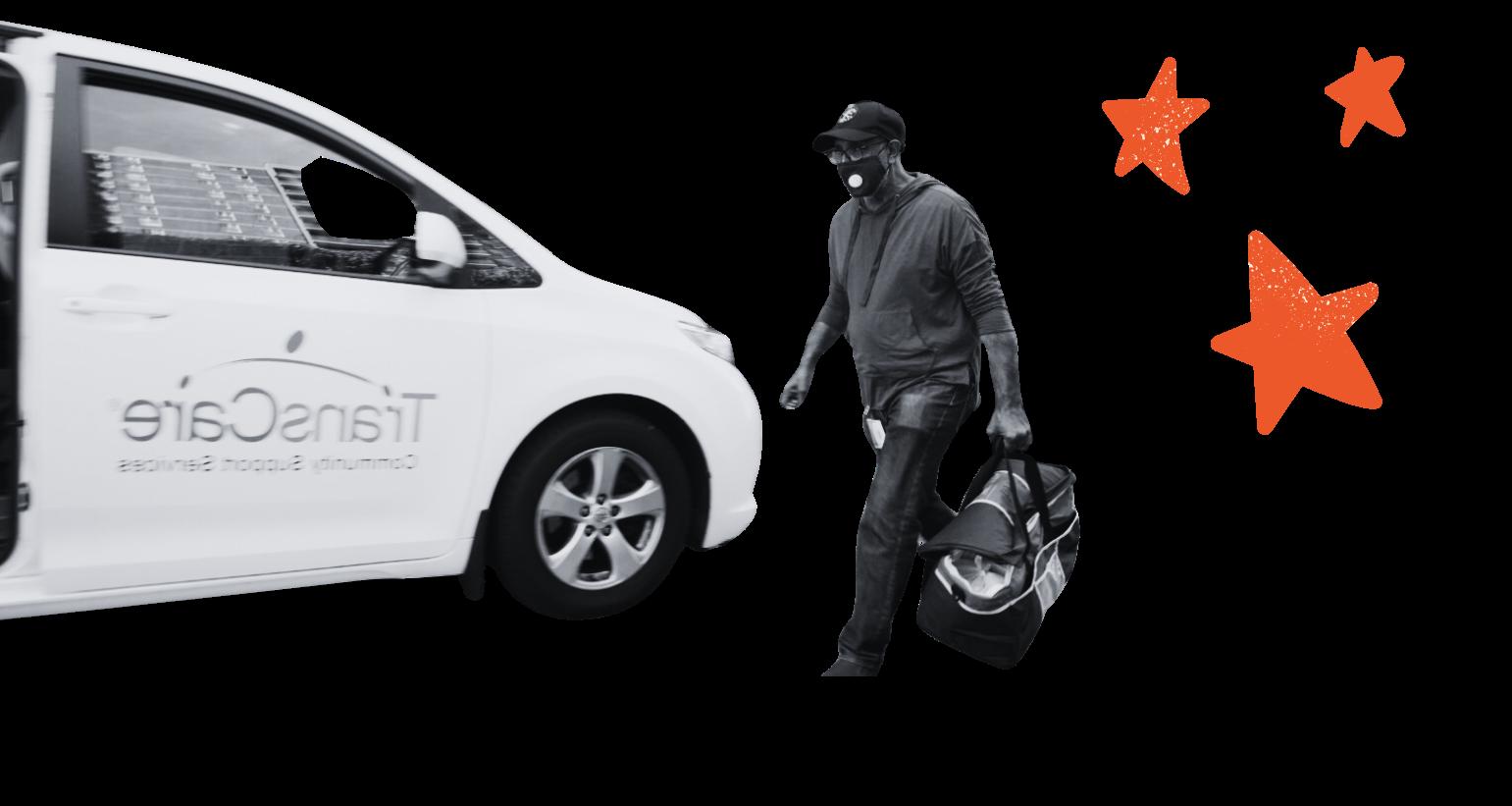






In March 2017, Volunteer Toronto released its research report, “ Why Meals on Wheels Programs in Toronto are Running 19% Short ” — providing an analysis on the recruitment challenges experienced by 17 non-profit organizations in Toronto.
Five years, and a global pandemic later, Volunteer Toronto is sharing an updated analysis which reveals that it is highly unlikely there will ever be enough volunteers to fill the constantly recruiting Meals on Wheels Volunteer Driver and Runner roles.
This report is based on primary data collected via Volunteer Toronto’s survey of 18 Torontobased Meals on Wheels providers and Meals on Wheels Ontario’s survey of 49 providers, both conducted between Fall 2022 and Winter 2023. A literature review and demographic analysis were also completed by University of Toronto Scarborough students. TD Mindpower consultants contributed secondary research.
Many think of Meals on Wheels as a singular cohesive organization, but it is actually a program run independently by many different non-profits and grassroots groups — all of which experience volunteer shortages.


18
Toronto Meals on Wheels Programs surveyed
20,621
Toronto-based clients served in 2022, a decrease of 2% from 2021
888,583
meals delivered to Torontonians in 2022, an increase of 5% from 2021
26% of meals delivered in Ontario were delivered to Torontonians










Meals on Wheels programs deliver nutritious food to vulnerable people who struggle preparing meals for themselves. Clients are seniors or people with disabilities, and they are often isolated or homebound. The benefits of the program go beyond the food itself — a visit from a volunteer provides basic social contact and a safety check. It can also help people keep living independently in their own homes and take stress off caregivers.
The benefits of home-delivered meals are clear — clients are healthier and happier thanks to Meals on Wheels. Studies have shown that home-delivered meal programs improve nutrition, increase food security, reduce loneliness (Wright et al., 2015), and even lower the risk of falls (Thomas et al., 2016).
“One of my clients doesn’t have any family and doesn’t leave his house very often. Over the course of a couple of days, myself and other volunteers noticed that he wasn’t as responsive as he normally is. We ended up having to call for help for him because he was declining. If it weren’t for the volunteers that deliver everyday, that might not have been noticed.”
— Meals on Wheels Volunteer Watch to learn why Transcare Community Support Services’ Meals on Wheels program is an essential service which local seniors and people with disabilities depend on every day for sustenance and connection.

Aging demographics, increased isolation, and financial pressures mean more people require a daily meal delivery and the social connection that comes with it. Provincially-funded Meals on Wheels programs saw a 39% increase in meals delivered between 2019 and 2020. Simultaneously, underfunded meals programs faced increased client requests, higher food prices, and driver shortages, resulting in the scaling back of food deliveries. It is no surprise that new grassroots and mutual aid groups have popped up to keep people fed. But how sustainable is this system? Have we reached our capacity to meet this need?


Food insecurity affects people differently due to systemic barriers, discrimination and inequitable access to resources. In 2023, Daily Bread Food Bank reported that 1 in 3 people who access the food bank have a disability. There is an overrepresentation of racialized communities among food bank clients compared to the population of Toronto. Food bank clients in Toronto have a median of $6.67 for food each day after other essential expenses (Daily Bread Food Bank, 2023).
Unlike food banks, the majority of Meals on Wheels programs delivered through established non-profits charge a fee for meal delivery. Despite organizations working to keep this fee low through government funding, the cost of accessible food delivery remains unattainable for many who need the service. Populations who hold multiple identities face compounding exclusion when it comes to food access and likelihood to afford meal delivery services.

13.2% of Toronto’s population lives below Canada’s LowIncome Measure After Tax. 96% of people living below the poverty line struggle with food insecurity. (City of Toronto, 2021).

Seniors represent the biggest share of lowincome Torontonians (16.9% live below the poverty line). Fixed incomes and mobility challenges mean they make up 86% of Meals on Wheels clients (City of Toronto, 2022).

20% of Torontonians (962,550 people) live with a disability, according to 2017’s census on disability (StatCan, 2019). Folks with disabilities, paricularly Ontario Disability Support Program recipients, are more likely to


There is an overrepresentation of Black, Arab/ Middle Eastern/West Asian, and Latin American clients at Toronto’s foodbanks. Black households are 3.56 times more likely to be food insecure than white households, and 13% more people who identified as Black, compared non-Black respondents, missed a meal to pay for something else (Daily Bread Food Bank, 2023).

2-Spirit, queer, trans seniors are often food insecure as a result of social isolation. Fear of deadnaming and misgendering at food access centres, insufficient government income and employment assistance on par with food costs, and culturally affirming food access are systemic barriers that result in higher rates of food insecurity for LGBQT+ people (The 519, 2023).

Indigenous Peoples disproportionately experience higher rates of food insecurity (FoodShare, 2020). Indigenous households are 3-5 times more likely to be food insecure than white ones (Daily Bread Food Bank, 2023) and Indigenous youth are impacted by food insecurity to the point of an urgent public health crisis (CTV News, 2023).
Volunteer Toronto would like to acknowledge that the primary data presented in this report does not yet capture the socio-economic or ethno-cultural identities of clients accessing the multitude of Meals on Wheels programs in Toronto, as well as the volunteer managers and grassroots leaders that work to resource programs through volunteers or mutual aid relationships.
Volunteer Toronto observed from 2020-2022 that many grassroots groups providing food security services during the pandemic were founded by individuals with lived experiences reflective of the populations described above, looking to support their communities facing similar intersectional barriers to food access.
Volunteer Toronto is committed to ongoing data collection on this issue to more clearly demonstrate the experience of impacted communities and leaders of Meals on Wheels programs.
For five years, Volunteer Meals on Wheels
Drivers have been the most in need, yet hardest volunteer role to fill. In a third of organizations surveyed, volunteers stay between six and 12 months – in two-thirds, they stay for over a year. Still, at any time, you will find numerous Volunteer Driver roles from multiple non-profits actively recruiting on VolunteerToronto.ca . Many postings never come down, because recruitment must be done constantly to barely meet demand. This is true even when a spike
in volunteer interest is driven by the holiday season or a media campaign, or, as in the early pandemic, when volunteer interest far outstripped demand. This is also despite the fact that most surveyed organizations incentivize volunteers by covering the cost of police checks, driver abstracts, and milegage. This neverending recruitment cycle led Volunteer Toronto to research the issue in 2018, and now in 2023, with the aim of finding a long-term solution.

65% of the time, organizations experience Meals on Wheels volunteer shortages


of all organizations maintained or increased their deliveries to meet growing needs, despite volunteer shortages

67% of organizations have relied on staff to deliver meals when volunteer drivers are short

28% of organizations were forced to reduce deliveries due to volunteer driver shortages
“With the program being an essential program that needs to stay up and running at all times, ensuring that we always have a roster of active volunteers is at times stressful, especially during Covid when no one wanted to volunteer.”
— Andrea Watson, Warden Woods Community Centre

“It feels at times that we’re in a state of panic and uncertainty if we don’t have enough volunteer drivers. It puts added pressure on the staff because they will have to cover shifts, and it puts added pressure on management, who will have to ensure that there is enough office coverage while staff are out on a route.”

Hand Up Toronto was founded in 2014 with the purpose of supplying in need Torontonians with ready-made meals, nutritional supplements, and hygiene necessitities (Hand Up Toronto, 2023). They launched their Family Support delivery program in October 2020 with a focus on supporting 300 to 500 families for six months. The goal of this initiative was to reduce the food insecurity that families in specific communities face.
This program ran successfully throughout October 2020 until November 2022, when they had to pause operations for three months because of volunteers dropping out and insuffienct funds.
Their volunteer base of 1200 has been drastically reduced. Volunteers reported that they struggled with the cost of using their own vehicle (despite mileage reimbusements). Others cited changed priorities, conflicting committments, and lack of time. While applicants are guided through the process, Hand Up Toronto has found that the requirement of a police check can deter some would-be volunteers.
The hiring of an Outreach Coordinator has led to the successful recruitment of volunteers through library branches and universities. Still, it has been a challenge to get volunteers to commit to six, or even three, months.
The focus, however, remains on sourcing sustainable funding. When first founded, the organization relied exclusively on the now unavailable federal Emergency Community Support Response Fund.
2 years delivering meals
2,400 community members served in 2021
10,700 food boxes delivered in 2021


25+ years delivering Meals on Wheels
180 community members served in 2021
52,000 meals delivered in 2021


WoodGreen Community Services has been in operation for 85 years and is one of Toronto’s largest social service providers. With over 40 locations across the city, WoodGreen serves more than 37,000 clients annually, providing them with various services such as mental health support, childcare, employment services, newcomer programs, and affordable housing (WCSS, 2023).
WoodGreen’s Meals on Wheels program serves more than 50,000 meals each year. Previously, the program had an average of 80 volunteers participating each week. Unfortunately, as of August 2022, the program has had less than 30 volunteers weekly, causing the organization to rely on its staff to deliver meals.
The Meals on Wheels program has faced challenges recruiting volunteers postpandemic, despite a variety of perks being offered. Some former volunteers have cited travel costs, unemployment, and the inability to commit to regular daytime shifts as reasons for their inability to volunteer. Older volunteers and retirees have expressed concerns over their health as the main reason for not volunteering.
However, the program’s increased social media outreach, newsletter marketing, and news coverage have helped to raise awareness of the issue and attract new volunteers.
There is hope that the program will soon have the same number of volunteers as it did before the pandemic.
How are Meals on Wheels programs funded? The answer might surprise you! While the majority of the organizations we surveyed receive provincial funding and donations, even more are financed via service user fees. These are fees charged to clients in exchange for the delivery of hot meals or grocery boxes. Grassroots organizations like Hand Up Toronto and The People’s Pantry are more likely to rely on donations, given that they don’t receive support from the government. More established nonprofits like Warden Woods Community
Centre and Scarborough Centre for Healthy Communities are more likely to supplement government and other funding with service user fees. However, as the cost of living increases as a result of inflation and rising food prices, these organizations may be forced to raise service user fees, pricing out many clients . It is therefore up to all three levels of government, and the provincial government in particular, to ensure that Meals on Wheels programs receive the funding they need to reach Toronto’s most in-need clients.
Is it even possible to fill all of the Meals on Wheels volunteer roles available in Toronto? Let’s take a look at the demographic data!
There are four layers of data that comprise the ideal Meals on Wheels Volunteer. This is based on age group, availability, likelihood to volunteer, and vehicle ownership. This makes our ideal volunteer an older adult. Seniors who volunteer as Meals on Wheels Drivers usually own a vehicle, volunteer formally, have more availability during the day, and are able to accommodate hot meal hours, especially lunch.
As we exit the pandemic, the demand for food banks and hot food delivery has only increase d (Daily Bread Food Bank and North York Harvest Food
Bank, 2022). Volunteer Drivers are therefore in greater demand than ever. Unfortunately, Toronto Foundation’s 2023 Vital Signs report announced a 12% decline in overall volunteering as of 2022. Volunteer Toronto surveyed seniors specifically in Winter 2023 and found that they weren’t returning to volunteering post-pandemic for a myriad of reasons, from concerns over personal safety to shifting priorities. Only 6% of Toronto’s seniors currently volunteer as Drivers . This is not nearly enough to meet the demand for hot food delivery by Torontonians in need.





Over 700,000 older adults live in the region (Statista, 2022) . Seniors are the most likely age demographic to fill volunteer driver roles with Meals on Wheels organizations , given that, as retirees, they’re likely to have daytime availability.
Only half of Torontonians own a car (Statistics Canada, 2020). This fact significantly cuts down on the number of individuals eligible to volunteer as Drivers, as most Meals on Wheels programs cannot afford to provide their volunteers with vehicles.
Less than half of Toronto’s population volunteers formally (Statistics Canada, 2021). Formal volunteering involves the unpaid sharing of skills and/or time with a group or organization. Volunteer Driver is generally considered a formal role, so only those looking for a formal volunteer opportunity would consider applying.
A very small subset of Toronto’s population are actually able and likely to volunteer as a Driver (Statistics Canada, 2021). They are typically seniors who are interested in volunteering formally and who own a car.
The volunteer recruitment pool for Drivers is small. There are exceptions to who is most likely to volunteer for this role—but en masse, the number of Torontonians who match the ideal demographics of a Driver isn’t an encouraging metric. The reality is that programs don’t need one or two drivers, but more than a thousand volunteers to meet current needs. This need will repeat with every cycle of volunteer drivers retiring from their role due to various life circumstances, which typically occurs every 6-12 months.
With the support of a volunteer team from the TD Mindpower program, Volunteer Toronto has analyzed data variables to narrow down the likely pool of volunteers who could be Volunteer Drivers. This exercise has revealed Volunteer Toronto’s target audience for recruitment, and benchmarks how low the likely conversion rate is for Driver participation. As a volunteer centre, bringing attention to systemic volunteer engagement challenges is key to forging positive change for all Torontonians, but especially those who rely on volunteers for essential services, like meals.
This theoretical analysis further supports the conclusion that there will never be enough Volunteer Drivers to fill the needs of the community. Each program is likely to continue to
experience inconsistent volunteer labour for meal deliveries on a dayto-day basis, staff burnout, and increased demand with no way to meet it via volunteer support. Exploring new solutions to this challenge is necessary—as Volunteer Toronto and other organizations have piloted over the past five years. However, with an issue this large scale and across multiple programs, it is also time to look at how programs are funded and resourced from the top down. Marketing, matching, and volunteer engagement may not be the sustainable solution to keeping people fed and safe through Meals on Wheels.
Only


713,222


356,611 Seniors + Own a Car
146,211 Seniors + Own a Car
Seniors Seniors
8,773
+ Own a Car
+ Volunteer
+ Likely to Fill the Driver Role
+ Volunteer Source: Statistics Canada,
A number of solutions have been tested to address Toronto’s chronic Volunteer Driver shortages; partnerships with corporate groups (one third of organizations in Toronto have tried this), targeted volunteer matching, even the creation of a new grassroots group specifically to help with deliveries. But each faces its own barriers, and often, only addresses one neighborhood, uplifts only one program, fills only one shift, or is subject to staff turnover. Replicating solutions to meet demand en masse, and over the long-term, is a significant challenge.
Founded in 1977, Scarborough Centre for Healthy Communities (SCHC) now operates out of 10 sites, providing 42 distinct services (SCHC, 2023).

Over the past few years, SCHC’s Meals on Wheels program has seen a significant increase in demand, placing increased pressure on staff to find the volunteers needed to operate the program effectively. Losing many volunteers during the pandemic, SCHC has worked hard to rebuild a strong volunteer base of committed individuals. While some who had volunteered pre-pandemic have not returned for various reasons, from not wanting to use their own vehicle to no longer having the same availability, SCHC has maintained the program through the support of staff from other areas and a small group of core volunteers.
As always, the Meals on Wheels program faces ongoing challenges in recruiting volunteers who are committed long-term. While one corporate group has volunteered consistently for over 15 years, engaging corporate groups has been met with mixed success. To support recruitment efforts, SCHC’s Volunteer Coordinator focuses on recruitment through social media and information sessions.

Volunteer Toronto’s Driver Matching Program was set up in October 2020 to address the Meals on Wheels driver shortage, particularly in Scarborough and East York. Volunteer Toronto typically does not pre-screen volunteers and assign them to external partners, so this was a departure for the organization.
In the surveys conducted throughout the pilot, participating organizations indicated that it was hard to bring on matched volunteers due to volunteers’ changing availability or willingness to participate.
These challenges indicate that volunteer centres intervening in the screening process may not be an end all solution moving forward.
In response to the COVID-19 pandemic we saw many mutual aid groups (e.g., Caremongering, Neighbourhood Pods TO, The Good Neighbour Project) popping up with the goal of solving problems through collective action.
While these grassroots organizations were able to leverage social media and word-of-mouth to successfully recruit volunteers and connect them with their marginalized neighbours, they were met with overwhelming need and struggled to meet demand.
In the end, their efforts were not sustainable and many succumbed to burnout as the issue of food insecurity is too widespread.


Born out of the pandemic, Bike Brigade partners with dozens of organizations, offering deliveries of essential items to those in need, including everything from a single meal to a week’s worth of groceries or medications.
Although Bike Brigade engages 65+ riders per week, allowing for 275+ deliveries, they have faced major road safety challenges related to lacking infrastructure and bike lanes. A case study of this is the Bike Brigade’s partnership with East York Meals on Wheels. Given a lack of recruitment from the neighbourhood, many volunteer riders are coming from downtown. However, the closest access point is over the Millwood Overpass Bridge, which is not bike-friendly, especially in the winter.
These last-mile deliveries that the Bike Brigade does are more efficient by bike in high-density areas, particularly if riders live in the neighbourhood in which the deliveries are occurring. However, as Bike Brigade organizer Julia Pyryeskina aptly notes, “It takes a great deal of economic and social privilege to have the time and the ability to volunteer as a cyclist.”
The Bike Brigade team has also found it challenging to safely deliver during the winter months. Bike lanes in some parts of the city were often blocked by snowbanks and damaged infrastructure, again hampering their ability to deliver meals and essential goods.


Since 1976, Transcare Community Support Services (TCSS) has provided home and community supports to people facing illness, convalescence, disability, or limitations due to aging (TCSS, 2023).
The Meals on Wheels program at TCSS has faced volunteer recruitment and retention challenges since the pandemic began. Following the pandemic, many of their volunteers were hesitant to return. Meanwhile, there’s been only a slow trickle of new volunteers coming in. Those who do join the program typically now only come in once, for a few hours. Ideally, volunteers would make a longerterm committment so that they can get to know the people they’re delivering to, spot changes in their clients’ health, and seek help on their behalf.
Volunteering has been a “hardsell” for folks, despite the fact that the organization offers mileage reimbursement. It used to be that volunteers over 55 were easy to recruit for this role but that is no longer the case. Staff believe that the pandemic has caused would-be volunteers to be more discerning about what they get involved in and how much time they dedicate to that cause. TCSS’ Volunteer Coordinator also notes that some prospective volunteers do not feel mentally prepared to provide support that comes with meal deliveries, such as safety and health checks, for vulnerable groups like seniors. The criminal record check or vulnerable sector screening can also be a barrier, with applicants dropping out when they hear that this is a requirement. Volunteer recruitment is now the priority and has become a significant source of stress , given that the program’s success depends on the support of volunteers.
46 years delivering Meals on Wheels
1178 community members served in 2021
97,112 meals delivered in 2021


The way Meals on Wheels programs are funded, staffed, and operated, is unsustainable and needs to change. 61% of Meals on Wheels programs in Toronto receive funding from at least one level of government, 39% receive funding from public or private foundations, 44% receive donations, and 55% charge service fees. However, additional funding is needed. The Ontario Community Support Association’s 2022 pre-budget submission calls for $677 million to be put into the home and community care sector. Sufficient funding would allow organizations to deliver more meals to more people, at a time when Torontonians are struggling with a cost-ofliving crisis. To make this happen, organizations could deploy these funds in one of the following ways:

As it stands, several barriers prevent enough people from pursuing Volunteer Driver roles. Many would-be volunteers do not own cars or, even if they do, cannot afford the additional gas that would be required to complete their volunteer shifts. Additional government funding would allow these organizations to ameliorate or eliminate such barriers. Organizations are already prepared to deploy these solutions. Of the organizations we surveyed, 33% stated that they would use any additional funding to purchase cars. 50% reported that they would use the funds to reimburse volunteers for their gas mileage.

While Meals on Wheels may be known as a volunteer-powered program, organizations are already relying on paid labor. 61% of surveyed organizations must often rely on paid staff to complete deliveries due to a lack of Volunteer Drivers. Beyond simply asking existing staff to step up, one of these organizations revealed that they have hired two part-time drivers. In fact, 56% of organizations surveyed reported that they would use any additional funds to start paying drivers.
Volunteers and staff are subject to different expectations. According to the Ontario Nonprofit Network, while volunteers can be expected to carry out their responsibilities with integrity, they should not be expected to commit to full-time work or seek approval to reschedule or miss shifts (2022). By employing professional drivers, organizations can set these expectations, resulting in the reliable delivery of meals.
44% of the organizations we surveyed said that they would use any additional funds to hire more staff to manage or coordinate their Meals on Wheels programs. Volunteer Management is a skilled and accredited profession – it is not something that can easily be done off the side of a desk. Hiring more volunteer managers and program coordinators would ensure that best practices are being followed when it comes to the recruitment, screening, training, supervision, and recognition of volunteers. Given the appropriate resources, managers can ensure that valuable volunteers are retained and new volunteers are drawn in.


This updated analysis of Meals on Wheels program data, volunteer motivations, Toronto demographics and other variables that continue to affect shortages is a launchpad for advocacy. How many Torontonians access food, and how well seniors are able to age at home, are directly impacted by the labour resource systems in place to support meal delivery programs. As major funders of meal programs and other community home care services, municipal governments and the Province of Ontario are key partners in generating systemic changes that promote food security for communities . There is also a role for non-profit leaders—such as volunteer managers, program directors, and executive directors—to challenge the way these programs are resourced and reflect on alternative pathways forward. It starts by listening to the data included in this report, understanding long-term trends in each organization, and being open to change.
Food is a human right. As Toronto’s volunteer centre, we commit to the below actions in addressing Meals on Wheels Driver shortages:
► Reframing shortages as a systemic issue
► Aligning with other advocates on key issues related to food security, aging well, and decent volunteerism
► Holding space for advocacy conversations with Meals on Wheels staff and volunteers
► Continuing to bring awareness to this systemic issue by compiling and analyzing data to identify trends on behalf of all organizations and programs that deliver meals in Toronto
If you would like to share your perspectives and learnings from this report, please contact info@volunteertoronto.ca .


The Power of Us: Toronto’s Vital Signs 2023 Special Report.
https://torontofoundation.ca/wp-content/up loads/2023/11/TF-VitalSigns2023-Tagged-Nov14.pdf
2021 Census: Age, sex at birth and gender, and
https://www.toronto.ca/wp-content/uploads/2022/04/9654City-Planning-2021-Census-Backgrounder-Age-Sex-Gender-DwellingType.pdf
Daily Bread Food Bank and North York Harvest Food Bank. (2022). Who’s Hungry
https://www.dailybread.ca/wp-content/uploads/2023/06/DBWhosHungryReport-2022-Digital-1.pdf
Daily Bread Food Bank and North York Harvest Food Bank. (2023). Who’s Hungry
https://www.dailybread.ca/wp-content/uploads/2023/11/DBWhosHungryReport-2023-Digital.pdf
Indigenous Food Insecurity. Retrieved February 6, 2024. https:// foodshare.net/custom/uploads/2020/10/4.-Putting-Race-on-the-Ta ble-Supporting-Documents-Indigenous-Food-Insecurity-Fact-Sheet.pdf
Volunteering counts: Formal and informal contributions
. Statistics Canada. https://www150.statcan.gc.ca/ n1/pub/75-006-x/2021001/article/00002-eng.htm
Hand Up Toronto. About. Retrieved September 12, 2023.
https://handuptoronto.org/about/
Ireland, N. “Food insecurity among Indigenous kids is a ‘public health crisis,’ doctors say” CTV News, Sep tember 29, 2023, https://www.ctvnews.ca/health/ food-insecurity-among-indigenous-kids-is-a-publichealth-crisis-doctors-say-1.6582705
Scarborough Centre for Healthy Communities. Our History. Retrieved September 12, 2023. https://schcontar io.ca/about-us/resources-publications/history/
Statista. (2022, August). Number of seniors in Canada in 2020, by province and age group. https://www. statista.com/statistics/485562/number-of-seniorsin-canada-by-age-group-and-province/

Statistics Canada. (2020, September 10). Archived - Vehicle registrations, by type of vehicle, inactive. https://www150.statcan.gc.ca/t1/tbl1/en/ tv.action?pid=2310006701&pickMembers%5B0%5D=1.7&cubeTimeFrame. startYear=2015&cubeTimeFrame.endYear=2019&referencePeriods=20150101% 2C20190101
Statistics Canada. (2019, December 12). Persons with and without disabilities aged 15 years and over, census metropolitan areas. https://www150.statcan.gc.ca/t1/tbl1/en/ tv.action?pid=1310075001
Strauss, K. (2021, August 19). Adults with disabilities face barriers accessing food, leading to food insecurity: U ofT study. University of Toronto. https://www.utoronto. ca/news/adults-disabilities-face-barriers-accessingfood-leading-food-insecurity-u-t-study
The 519. Food for All. May 10, 2023. https://www.the519.org/food-for-all/
Thomas, K., et al. (2018). Home-delivered meals and risk of self-reported falls: re sults from a randomized trial. Journal of Applied Gerontology, 37.1, 41-57.
Transcare Community Support Services. About Us. Retrieved September 12, 2023. https://www.tcare.ca/about_who_what.php
WoodGreen Community Social Services. About Us. Retrieved September 12, 2023.
https://www.woodgreen.org/about-us
Wright, L., et al. (2015). The impact of a homedelivered meal program on nutritional risk, dietary intake, food security, loneliness, and social wellbeing. Journal of Nutrition in Gerontology and Geriatrics, 34.2, 218-227




We partnered with the pro-bono consultants at TD Mindpower to produce the funnel graphic you see on pages thirteen and fourteen. We would like to thank Matt Forer, Pycus Dela Cruz, and Kayra Copur for the secondary research they contributed to this project.
Our survey of Toronto-based Meals on Wheels providers was matched by Meals on Wheels Ontario’s wider survey of Ontario-based providers. We would like to thank them for collecting the provincial data which is presented in graphs throughout this report.

We would like to acknowledge the University of Toronto Scarborough students whose work, completed as part of their Winter 2022 “The Role of Researcher-Practitioner Engagement in Development” course, informed this report.
This report was created by the following Volunteer Toronto staff members:
Samah AbdelAziz, Writer
Cara Eaton, Project Manager and Writer
Kasandra James, Research Coordinator and Writer
Tatiana Letang, Writer
Roshini Matthews, Writer
Olivia Sonnenberg, Writer, Lead Designer and Copy Editor






